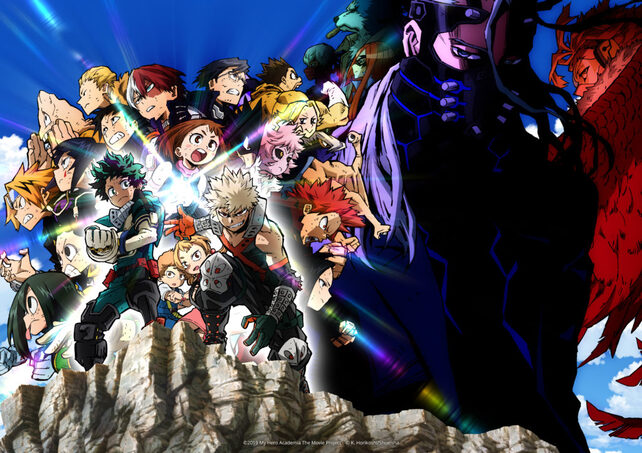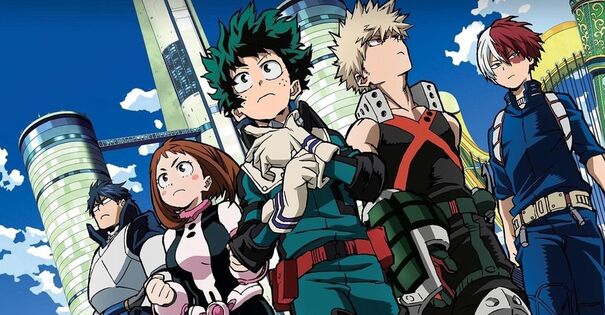The word “Shounen” (少年) in Japanese means “boy”. Similarly, the genre of shonen is specifically made for boys in their teens or younger. Because of this, shonen anime usually focuses around the theme of friendship, youth, and power. Most shonen anime depict their main character banding with a bunch of friends and coming together to defeat enemies. In other words, friendship and youth lets the main character gain enough power to defeat an even more powerful enemy.
My Hero Academia (僕のヒーローアカデミア), directed by Kenji Nagasaki in 2014 is a Japanese animated TV series that falls right under the category of shonen. At the time of its release, it struggled since it had to compete with other shonen anime that were extremely popular. However, My Hero Academia quickly gained popularity since it was new, and many people who had never seen anime before began to watch this show. Like other anime shows, the series emphasized the following themes of friendship, youth, and power.
My Hero Academia: Heroes Rising follows the TV series, which takes place in a world where people have superpowers, called quirks. Quirks are vastly different and can be hereditary. Both the movie and the series focuses on the life of Deku, a student with green hair at U.A. Highschool, where superheroes are raised and trained. However, Heroes Rising takes place not at the school, but on the island of Nabu, where Deku and his classmates are posted for training. According to the teachers and the heads of U.A., no villain has appeared on the island for years. Unfortunately for the novice heroes, a group of villains appear on Nabu, and without any help from professional heroes, they have to find a way to stop them. What’s worse is that the main villain is extremely overpowered since he possesses six different quirks.
This is why the antagonist of My Hero Academia: Heroes Rising fits so perfectly within the genre of shonen. With six different quirks, he seems unstoppable. In comparison, Deku is just a small, teenage boy aspiring to be a hero. As a child, Deku was one of the 20% of people born without a quirk. Since he was quirkless, he was bullied his whole life. This plot element allows the audience to empathize with Deku and cheer for him. Eventually, when he does receive a quirk, he has no mastery over it, so he has to learn how to use it. Against the seasoned veteran antagonist, Deku appears small and powerless.
However, Deku has amazing mental fortitude. This characteristic is shared by main protagonists of other shonen anime, such as Haikyuu (Susumu Mitsukana, 2014), or Attack On Titan (Tetsuo Haraki, 2013). Whatever happens, the protagonists of these anime never let anything discourage them. In the same way, even when Deku was powerless and quirkless, he never gave up. This is why the shonen genre is so inspiring. Even when it seems hopeless, through hard work and positivity, the good guy always wins.
The main reason the Shonen genre is so popular is because people of all ages are able to relate to it. For example, Marvel’s Avengers series is so popular because it follows the same kind of strategy Shonen anime does. The Avengers are just a collection of superheroes, who team up together to fight the powerful opponent, Thanos. In My Hero Academia: Heroes Rising, Deku and his classmates team up together and fight the powerful opponent Nine. This is why the movie was so successful. Just like the Avengers and other Shonen anime, My Hero Academia: Heroes Rising used techniques that older movies and TV shows have been using to entertain audiences for years.




 RSS Feed
RSS Feed
